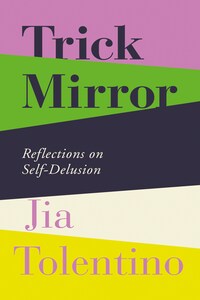4th Estate
An imprint of HarperCollinsPublishers
1 London Bridge Street
London SE1 9GF
www.4thEstate.co.uk
This eBook first published in Great Britain by 4th Estate in 2019
First published in the United States by Random House in 2019
Copyright © Jia Tolentino 2019
Jia Tolentino asserts the moral right to be identified as the author of this work
A catalogue record for this book is available from the British Library
All rights reserved under International and Pan-American Copyright Conventions. By payment of the required fees, you have been granted the non-exclusive, non-transferable right to access and read the text of this e-book on-screen. No part of this text may be reproduced, transmitted, down-loaded, decompiled, reverse engineered, or stored in or introduced into any information storage and retrieval system, in any form or by any means, whether electronic or mechanical, now known or hereinafter invented, without the express written permission of HarperCollins
Source ISBN: 9780008294922
Ebook Edition © August 2019 ISBN: 9780008294946
Version: 2019-06-21
I wrote this book between the spring of 2017 and the fall of 2018—a period during which American identity, culture, technology, politics, and discourse seemed to coalesce into an unbearable supernova of perpetually escalating conflict, a stretch of time when daily experience seemed both like a stopped elevator and an endless state-fair ride, when many of us regularly found ourselves thinking that everything had gotten as bad as we could possibly imagine, after which, of course, things always got worse.
Throughout this period, I found that I could hardly trust anything that I was thinking. A doubt that always hovers in the back of my mind intensified: that whatever conclusions I might reach about myself, my life, and my environment are just as likely to be diametrically wrong as they are to be right. This suspicion is hard for me to articulate closely, in part because I usually extinguish it by writing. When I feel confused about something, I write about it until I turn into the person who shows up on paper: a person who is plausibly trustworthy, intuitive, and clear.
It’s exactly this habit—or compulsion—that makes me suspect that I am fooling myself. If I were, in fact, the calm person who shows up on paper, why would I always need to hammer out a narrative that gets me there? I’ve been telling myself that I wrote this book because I was confused after the election, because confusion sits at odds to my temperament, because writing is my only strategy for making this conflict go away. I’m convinced by this story, even as I can see its photonegative: I wrote this book because I am always confused, because I can never be sure of anything, and because I am drawn to any mechanism that directs me away from that truth. Writing is either a way to shed my self-delusions or a way to develop them. A well-practiced, conclusive narrative is usually a dubious one: that a person is “not into drama,” or that America needs to be made great again, or that America is already great.
These essays are about the spheres of public imagination that have shaped my understanding of myself, of this country, and of this era. One is about the internet. Another is about “optimization,” and the rise of athleisure as late-capitalist fetishwear, and the endlessly proliferating applications of the idea that women’s bodies should increase their market performance over time. There’s an essay about drugs and religion and the bridge that ecstasy forms between them; another about scamming as the definitive millennial ethos; another about the literary heroine’s journey from brave girl to depressed teenager to bitter adult woman who’s possibly dead. One essay is about my stint as a teenage reality TV contestant. One is about sex and race and power at the University of Virginia, my alma mater, where a series of convincing stories have exacted enormous hidden costs. The final two are about the feminist obsession with “difficult” women and about the slow-burning insanity that I aquired in my twenties while attending what felt like several thousand weddings per year. These are the prisms through which I have come to know myself. In this book, I tried to undo their acts of refraction. I wanted to see the way I would see in a mirror. It’s possible I painted an elaborate mural instead.
But that’s fine. The last few years have taught me to suspend my desire for a conclusion, to assume that nothing is static and that renegotiation will be perpetual, to hope primarily that little truths will keep emerging in time. While I was writing this, a stranger tweeted an excerpt of a








